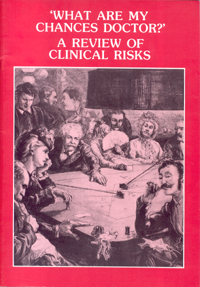Half a century ago little attention was paid to the risks associated with medical and surgical treatment. The hazards of sickness itself were so obvious, that…
Half a century ago little attention was paid to the risks associated with medical and surgical treatment. The hazards of sickness itself were so obvious, that the considerable risks of medical intervention were more or less taken for granted.
In 1986 the situation…
Half a century ago little attention was paid to the risks associated with medical and surgical treatment. The hazards of sickness itself were so obvious, that the considerable risks of medical intervention were more or less taken for granted.
In 1986 the situation is completely different. The classical ‘killer’ diseases affecting children and young adults have largely been eliminated as a result of therapeutic progress. Much of medical care is now concerned with prolonging life in cases of chronic disease such as diabetes or hypertension or alternatively with improving the quality of life for people with diseases like arthritis or schizophrenia.
In addition, ‘high-tech’ medicine is replacing the simple procedures of the 1930s, and some of the recent innovations are associated with significant new risks. Thus doctors are now more than ever faced with the problem of balancing immediate risks against long-term benefits. And health providers as a whole, including those who have discovered and manufactured modern medicines. are consequently sometimes accused of exposing patients to unjustifiable hazards.
This paper by Bernie O’Brien of the Health Economics Research Group at Brunei University is part of a continuing attempt to put these problems into perspective. It should improve its readers’ understanding of the difficult exercise of balancing the risks associated with disease against the often much publicised risks associated with their treatment.
As Bernie O’Brien points out ‘risk’ is a relatively new and largely professional concept. Patients generally think in terms of their ‘chances’ both of recovery and of possible harm from their treatment. The health professions, the consumerist organisations and the media need to develop a more sophisticated awareness of the ways in which patients can be helped to assess the relative risks of their illness and their treatment. This paper should help to provide this all-important awareness. That, in turn, should enable doctors and their patients to make more rational decisions about the risks and benefits of modern therapies.
